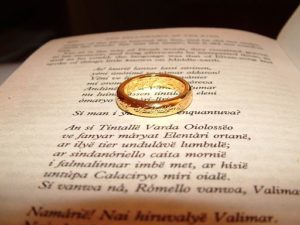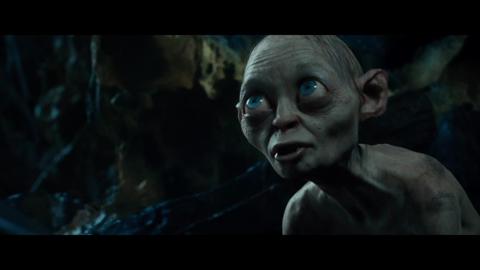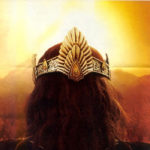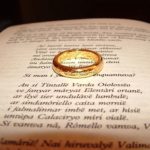Evil And The One Ring To Rule Them All
 October! As we dive into the heart of autumn, many turn their thoughts toward the spooky. I’ve seen ads for scary movies, horror-ish TV programs, and the requisite decorations and costumes that accompany Halloween. I thought perhaps it was time to revisit some thoughts on the subject of evil. Hence, this re-post of an article that first appeared here five years ago. It’s about a timeless subject explored by one of the timeless pieces of speculative fiction.
October! As we dive into the heart of autumn, many turn their thoughts toward the spooky. I’ve seen ads for scary movies, horror-ish TV programs, and the requisite decorations and costumes that accompany Halloween. I thought perhaps it was time to revisit some thoughts on the subject of evil. Hence, this re-post of an article that first appeared here five years ago. It’s about a timeless subject explored by one of the timeless pieces of speculative fiction.
Evil is one of the more compelling topics of theology, literature, and philosophy. Does evil exist? If so, where did it come from? And why can’t an all powerful God dispatch it? Fantasy as a genre is dedicated to an examination of evil in conflict with good. As we might expect, the great fantasy writers of the modern era led the way.
J. R. R. Tolkien created some classic representations of evil–corrupted men (the Ringwraiths), a corrupted wizard (Saurman), and a Ring able to corrupt all.
It is the Ring I find most fascinating. As Dr. Michael D.C. Drout (Weaton College) said in Exploring Fantasy Literature: Course Guide
The Ring was made by and belongs to Sauron, the Dark Lord, who is attempting to conquer all of Middle-earth. It was lost many years ago, but now it is trying to get back to its master, who is seeking it. With the Ring, the Dark Lord is effectively invincible. If the Ring were to be destroyed, the Dark Lord would fall. Furthermore (and this is the key gimmick) the Ring cannot be used for good: it is somewhat sentient, and it can turn anyone who uses it for domination into a slave of the Dark Lord.
Tolkien, as most speculative readers know, was not attempting an allegory. Nevertheless, his mythopoetic world, the result of his sub-creation, contains parallels with reality. In fact, his world throws revelatory light on what he believed about certain things in the real world. One of those things is evil.
Based on Dr. Drout’s summary above, I think it’s safe to conclude that Tolkien believed evil existed, that it came from some source other than God, and that it could never be used for good.
These seem to be Biblical positions as well. James 1:13 clearly divorces evil from God:
Let no one say when he is tempted, “I am being tempted by God”; for God cannot be tempted by evil, and He Himself does not tempt anyone.
Throughout Scripture evil or wickedness is contrasted with good or righteousness. Perhaps no passage lays out the duality as clearly as Psalm 1:
How blessed is the man who does not walk in the counsel of the wicked,
Nor stand in the path of sinners,
Nor sit in the seat of scoffers!
But his delight is in the law of the LORD,
And in His law he meditates day and night.
He will be like a tree firmly planted by streams of water,
Which yields its fruit in its season
And its leaf does not wither;
And in whatever he does, he prospers.
The wicked are not so,
But they are like chaff which the wind drives away.
Therefore the wicked will not stand in the judgment,
Nor sinners in the assembly of the righteous.
For the LORD knows the way of the righteous,
But the way of the wicked will perish.
The Apostle Peter reiterates the distinction in his first letter:
“For the eyes of the Lord are toward the righteous,
And His ears attend to their prayer,
But the face of the Lord is against those who do evil.” (1 Peter 3:12)
Notice, however, that this duality of opposition is not a duality of two equal entities. Evil is not a force of equal or greater value in opposition to God.
Genesis 1:1 makes this clear. God was in the beginning, not God and a second god responsible for evil. At the same time, Genesis 1 makes it clear that God did not create evil. All He made was good.
So where does evil come from?
 According to Tolkien, the Dark Lord created the One Ring to rule them all, to bind them. Did he believe that the One Ring was the equivalent of Evil or Sin? Hard to say. I’ve not read any commentary on this point. But clearly he created the Ring as a corrupting agent, and since we know from Scripture that Sin taints all Mankind and corrupts the world (see Rom. 8:22), it’s not a stretch to see similarities between the Ring and Sin.
According to Tolkien, the Dark Lord created the One Ring to rule them all, to bind them. Did he believe that the One Ring was the equivalent of Evil or Sin? Hard to say. I’ve not read any commentary on this point. But clearly he created the Ring as a corrupting agent, and since we know from Scripture that Sin taints all Mankind and corrupts the world (see Rom. 8:22), it’s not a stretch to see similarities between the Ring and Sin.
But that doesn’t answer the question about Evil. Rather, the existence of Sauron more nearly addresses that topic. He is the embodiment of Evil in Middle Earth, and the Ring is simply his tool.
In Scripture, the rebellious, fallen angel we know as Satan seems to embody evil. He was the agent of temptation, not only of Eve and Adam, but also of Christ. Nevertheless, his evil is not something he created but is the negation of God. He brought into question God’s word (“Has God said …”), God’s truth (“You surely will not die”), God’s sovereignty (“you will be like God”).
In short, Satan is all that God is not. God is not limited or sinful or selfish or merciless. At the same time, Satan is not what God is. God is all powerful, omniscient, unchanging, wise, good.
Evil, then, is not God. It is in direct opposition to God but it is in no way equal to Him.
Tolkien’s exploration of evil and sin in his stories, as good as it is, falls short in this last point, I believe–perhaps because he has no clear depiction of God (although I could be wrong on this since I haven’t read all his stories).
He shows Sauron as the most powerful force, one that will inevitably win unless the Ring can be destroyed. The Elves and Men are noble because they are committed and willing to die in what appears to be a hopeless cause. In other words, in Middle Earth, Evil has the upper hand.
Is that a reflection of reality? Only if God isn’t painted into the picture. So in The Lord of the Rings, it was accurate, but in real life, though Evil may appear to be winning, there is a great deal more to the story.










































I was going to let someone else say something, since i’m not really keen on the kind of research that an in-depth response would require, but seeing as no one’s said anything, i’ll point out that yes, Middle Earth does have a God.
I doubt Tolkien intended The One Ring as the ultimate depiction of sin. Sauron himself isn’t even the closest thing to a Satan-analogue — that would be Morgoth, who tried to sing his own song when God created the world, only to be told by God: “And thou, Melkor, shalt see that no theme may be played that hath not its uttermost source in me, nor can any alter the music in my despite. For he that attempteth this shall prove but mine instrument in the devising of things more wonderful, which he himself hath not imagined.”
I’m not an expert on Tolkien, but i know one of the things he loved about Norse mythology was the bravery in the face of certain defeat: ultimately, Fenris Ulf will devour the world and end everything, but until then, the brave fight, and are honored in Valhalla. That’s probably the reason that in so much of “The Lord of the Rings” and “The Silmarillion”, it seems like Evil has the upper hand. But that’s not the end of the story.